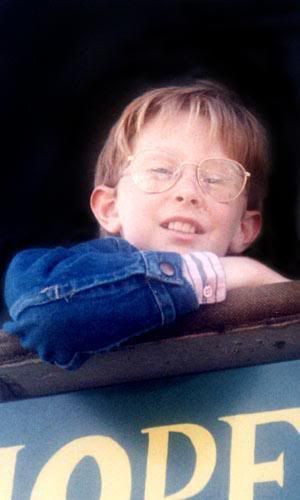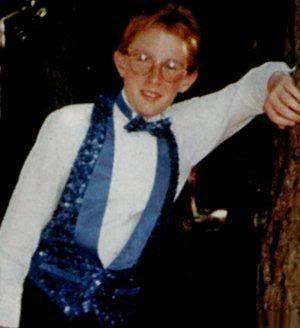On April 19th, 2005, Dr. Phil hosted a show about kids and bullying. The guest for the show was Clay Aiken.
 Clay Aiken got picked on and bullied as a kid, but found his gift, embraced it and changed the experience of his life. He shared part of his story on the show and in his book, Learning to Sing.
Clay Aiken got picked on and bullied as a kid, but found his gift, embraced it and changed the experience of his life. He shared part of his story on the show and in his book, Learning to Sing.
The following excerpts of Clay’s book make you really think and question how one small boy could survive so much. Yet, as an adult, Clay was able to find out who he was and develop into a person who is comfortable and happy with whom he became.
Chapter Five: “Find Your Voice”
When I was young, I was teased by other kids like it was their job.
I recall riding the school bus and always sitting in the seat right behind the bus driver. I would talk his ear off and hope that the kids behind me wouldn’t tease me and that if they did I wouldn’t hear it.
I wasn’t very popular in grade school. I had friends, but they were kids like me — geeky, shy, unable to fit in. I was a different sort of kid. Some of it came — and I hope my mom won’t get upset by this — because I spent a large chunk of my childhood around nobody but adults.
……
Middle school was the worst. Middle school is where everybody goes through that change, trying to figure out who they are. Kids feel threatened at that age.
Feeling threatened, I became somewhat reclusive. It made me a little bit quieter, and I tried to stay out of everybody’s way. When the bullies felt threatened, it meant that they were going to go on the offensive, and who better to go after than the quiet kid in the corner?
There was this game called Wall Ball that kids liked to play. The slowest kid would end up standing against the playground wall and the other kids would pelt him with a ball. One guess who that might have been.
……..
Back at school, my survival tactic was to be nice to everybody. My mom taught me — wrongly, I learned — to just be kind to the bullies and then they’d come around. But when you are a geeky, gawky kid with orange hair, glasses, and old-man sweaters, they don’t come around. Little boys don’t one day wake up and say, “Gee, my yanking that little boy’s underpants out of his corduroys is mean-spirited and I should really cut it out.”
Those boys learned pretty quickly that I wasn’t going to fight back and I wasn’t going to tattle on them. The nicer I was, the bigger the target on my forehead. The high road left me defenseless. And the mockery only got worse.
“Retard.”
“Fag.”
“Wimp.”
“Dork.”
“Four eyes.”
“Loser.”
I got it all. But the thing is, the more I took it, the less I cared. Being harassed became a part of my day, and I accepted it.
I know it sounds sad now, looking back, but at the time I wasn’t analyzing it. I was just living my life. I think the bullying helped me figure out at an early age that stuff is going to happen to you that you wish wouldn’t. People are going to treat you badly, and ultimately that is out of your control.
Excerpted from Learning to Sing by Clay Aiken with Allison Glock Copyright © 2004 by Clay Aiken with Allison Glock.
Clay was not alone in being bullied as a child.
 Recent studies suggest that about one-third of U.S. students aged 12 to 18 have been subjected to some form of bullying. Much of the harassment now takes place online, where the bullies find it easier to hide behind hurtful e-mails, texts and Facebook posts. Although as many as 40 states now have laws on the books that address bullying, much of the responsibility for prevention still lies with schools and the administrators that oversee them.
Recent studies suggest that about one-third of U.S. students aged 12 to 18 have been subjected to some form of bullying. Much of the harassment now takes place online, where the bullies find it easier to hide behind hurtful e-mails, texts and Facebook posts. Although as many as 40 states now have laws on the books that address bullying, much of the responsibility for prevention still lies with schools and the administrators that oversee them.
Despite the recent focus on bullying, some far-sighted schools have had anti-bullying programs in place for years. The best involve the entire school community, with kids, parents, teachers and other staff trained to recognize and report bullying and take preventive measures as soon as possible.
One of the most popular programs currently in place is the Olweus Bullying Prevention Program, a system developed in response to the suicides of three Norwegian boys back in the 1980s. Dan Olweus, a pioneering bullying research professor, used the results of his studies to create a prevention program that has been in use ever since. The system aims to reduce incidences of bullying and improve the overall atmosphere of a school by fostering warmth, a positive outlook, and a zero-tolerance policy from involved adults.
 Over 32 public schools in Philadelphia have adopted the program. Other schools from Virginia to Arizona have reported encouraging results, including a school in California that recorded a 21% decrease in reports of bullying just one year after implementing the prevention program.
Over 32 public schools in Philadelphia have adopted the program. Other schools from Virginia to Arizona have reported encouraging results, including a school in California that recorded a 21% decrease in reports of bullying just one year after implementing the prevention program.
In April of 2013, The American Educational Research Association issued a new report recommending the best practices and policies for schools and colleges to address bullying.
According to AERA:
The task force that wrote the report was asked to identify the causes and consequences of bullying, highlight training opportunities for faculty and staff, evaluate the effectiveness of current bullying prevention programs, and asses the connections between legislation and current bullying research and interventions.
One thing they thought was very important was that there are opportunities for staff, students, and parents to discuss the topic and its solutions across academic and social contexts.
Thank you, Clay Aiken, for sharing a part of your life with us. So many people can learn from your experiences and you are an encouragement for children who are bullied.
The following video is part of the Clay Aiken/Dr.Phil Show.

